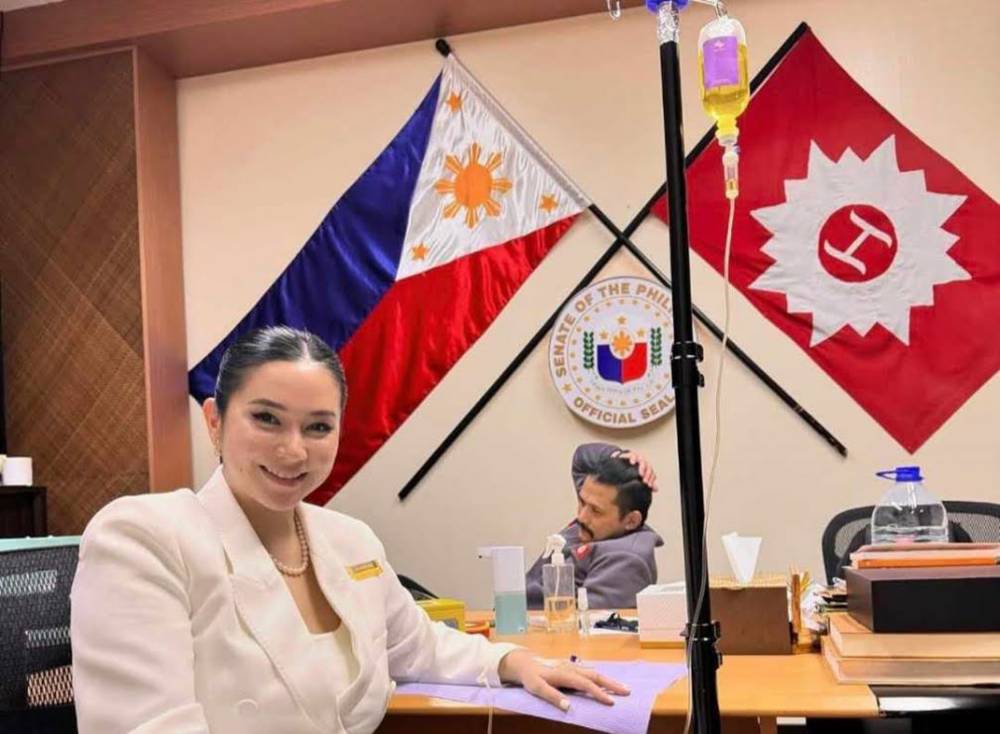 |
| Photo borrowed from The Inquirer |
When Mariel Rodriguez posted the glutathione drip photo (Vitamin C drip lang daw, kayo naman) in the stately confines of Senator Robinhood Padilla's office, the ripple effect was immediate.
Senator Nancy Binay's subsequent reflection on this act ignited public discourse and prompted a deeper personal inquiry for me. As the spouse of a government official, this incident struck a chord. It begged the question: where do we draw the line? What is permissible for public officials and their kin, and what falls outside the bounds of propriety?
This scenario unfurls against Republic Act 6713, a legislative canvas sketching the ethical contours for those in public service. Yet, as I delved into the nuances of this law, the question loomed larger: Did Mariel's actions, by extension, blur these ethical lines? This introduction is not just a prelude to a discussion; it's an invitation to navigate the intricate dance of ethics, public service, and our expectations for those in the limelight.
Respecting the Office: A Foundation of Public Service Ethics
Republic Act 6713 highlights the importance of integrity, accountability, and respect in public service. This Act guides public officials in the Philippines, reminding them of their duty to the public and the trust placed in their positions.
An experience with my in-laws, related to an Ombudsman judge, illustrates this point vividly. A joke about the judge's profession was made during a family gathering. The judge's response was memorable: "You are not obligated to respect me, but you need to respect my position and office." This moment underlines a crucial aspect of public service—the distinction between the personal and the professional and the universal need to respect the office held.
This story connects deeply with the essence of the point I'm trying to raise. It's not just about following laws like Republic Act 6713; it's about understanding the gravity and respect that public positions command. Even without explicit rules for family members of public officials, a sense of decorum and respect for the office should guide our actions. This anecdote serves as a powerful reminder of the respect and mindfulness required around public service, setting a respectful tone for our entire discussion on ethics and behavior in government.
Imagined Scenario and Ethical Reflection
I was thinking about how this whole incident might have begun. Imagining the conversation that led up to the controversial moment helps us understand the lapse in judgment and the absence of ethical considerations. In my head, the dialogue would unfold something like this:
Gluta Drip Provider: "Ma'am, kailan po kayo magpapagluta drip?"
Mariel: "Available ka ba today? Kaso nandito ako sa office ng asawa ko sa Senado."
Provider: "Ah, nasa Senado po kayo? Opo, puwede po ako."
(Note: This is an imagined conversation. Wag kang ano diyan.)
The scenario unfolds without anyone questioning the appropriateness of conducting personal beauty treatments in a government office. Notably absent is any intervention from senior staff or, crucially, Senator Padilla himself. ("Hon, huwag dito. Nasa opisina tayo. Binabayaran ako ng mga tax payer bilang isang senador at serbidor, baka kung anong isipin nila." WALANG GANON, ROBIN?) This absence of objection raises profound questions about the ethical compass and common sense that should guide the actions of those in public service and their immediate circle.
Adding the Discussion on Common Sense
Common sense should prevail when the law might not explicitly forbid personal activities like receiving a glutathione drip in a senator's office. One would expect the senator or at least a senior staff member to step in and question the suitability of such actions. The failure to do so paints a concerning picture of the judgment and priorities within the office. It suggests a disconnect from the principles of dignity, respect, and public trust fundamental to public service.
Reflecting on Senator Padilla's Role
This oversight prompts a deeper reflection on the type of leadership and example Senator Padilla is setting. Public offices are not just physical spaces; they symbolize the trust and responsibility the electorate bestows. Actions taken within these spaces and the behaviors allowed to pass without comment send a powerful message about the office holder's values and respect for their office.
Further Ethical Considerations
The lack of pause for ethical consideration — from planning the drip (vitamin C man yan or glutha) to posting it online — betrays a worrying insensitivity to the expectations and ethical standards incumbent upon those associated with governance. It prompts us to question: If common sense and basic respect for the sanctity of public office are absent in such simple matters, how are more complex ethical dilemmas being navigated, di ba?
Navigating Ethics in Public Life: A Reflection
The public's response to Mariel Rodriguez's actions was swift and vocal, showing how deeply people care about the conduct of public figures and their associates. This reaction highlights the importance of accountability in public service, emphasizing that actions have consequences, especially when they appear to misuse public resources or disrespect public offices.
Accountability extends beyond legal obligations, touching on the public's trust and expectations for those in public service. When incidents like this occur, they test the accountability mechanisms in place, challenging public officials to respond appropriately and uphold the standards of their office.
This situation with Senator Padilla and Mariel Rodriguez serves as a reminder of the scrutiny public figures face and the need for them to act with a keen awareness of their role as stewards of public trust. How such incidents are handled can significantly affect public perception and trust in the political landscape.
The Power of Social Media: Shaping Public Perception
Social media greatly shapes how the public sees individuals, brands, and issues. It's a platform where voices are amplified, and reputations can be made or broken with a single post.
David Alston's words emphasize the core of social media's influence: "Social media is not a media. The key is to listen, engage, and build relationships." It's not just about broadcasting; it's about genuine interaction.
Public figures like Mariel Rodriguez experience this dynamic firsthand. Social media provides them a powerful tool for brand and reputation management, yet also leaves them vulnerable. A single misstep can ignite a wave of backlash that reshapes their public image. This highlights the need to understand the responsibility of having a significant online presence. In today's world, social media is an undeniable force in molding public perception.
Having said this, the question lingers: what motivated Mariel's decision to post that photo and receive a glutathione drip in a senator's office? Was it a simple lack of judgment, a tone-deaf display of privilege, or something else entirely? This incident highlights the complex relationship between social media, public figures, and the delicate balance between personal lives and professional expectations.
Demanding Integrity: A Spouse's Perspective
Being the spouse of a government official, this incident made me acutely aware of the crucial need for decorum and ethical standards. This need extends even to those within our families. The apparent lack of accountability and oversight displayed in this situation raises questions about the ethics of this specific public figure and how Filipinos choose their leaders. This incident is a profound lesson, highlighting the importance of integrity and responsibility for those entrusted with public service.
I urge all of us to demand higher ethical standards from our leaders and those within their spheres of influence. If we do not demand accountability for even seemingly small lapses in judgment, what ripple effects will this have on the overall trust we place in our government institutions? It compels me to ask: what kind of leadership we truly want for our country, and how can we ensure that those we elect embody the ethical values we hold dear?

.png)


Comments
Post a Comment